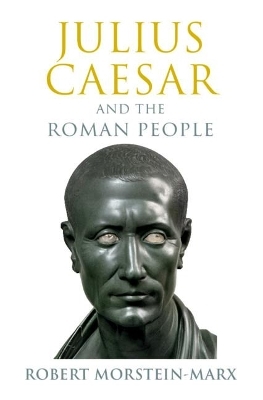
Julius Caesar and the Roman People
Seiten
2021
Cambridge University Press (Verlag)
978-1-108-83784-2 (ISBN)
Cambridge University Press (Verlag)
978-1-108-83784-2 (ISBN)
A thorough reconsideration of Julius Caesar's career throughout the crisis of the Roman Republic. Argues that Caesar was not an aspiring autocrat seeking to overthrow the Republic, but an unusually successful republican political leader against whom a determined opposition ultimately preferred to wage civil war rather than accept political defeat.
Julius Caesar was no aspiring autocrat seeking to realize the imperial future but an unusually successful republican leader who was measured against the Republic's traditions and its greatest heroes of the past. Catastrophe befell Rome not because Caesar (or anyone else) turned against the Republic, its norms and institutions, but because Caesar's extraordinary success mobilized a determined opposition which ultimately preferred to precipitate civil war rather than accept its political defeat. Based on painstaking re-analysis of the ancient sources in the light of recent advances in our understanding of the participatory role of the People in the republican political system, a strong emphasis on agents' choices rather than structural causation, and profound scepticism toward the facile determinism that often substitutes for historical explanation, this book offers a radical reinterpretation of a figure of profound historical importance who stands at the turning point of Roman history from Republic to Empire.
Julius Caesar was no aspiring autocrat seeking to realize the imperial future but an unusually successful republican leader who was measured against the Republic's traditions and its greatest heroes of the past. Catastrophe befell Rome not because Caesar (or anyone else) turned against the Republic, its norms and institutions, but because Caesar's extraordinary success mobilized a determined opposition which ultimately preferred to precipitate civil war rather than accept its political defeat. Based on painstaking re-analysis of the ancient sources in the light of recent advances in our understanding of the participatory role of the People in the republican political system, a strong emphasis on agents' choices rather than structural causation, and profound scepticism toward the facile determinism that often substitutes for historical explanation, this book offers a radical reinterpretation of a figure of profound historical importance who stands at the turning point of Roman history from Republic to Empire.
Robert Morstein-Marx is a Professor of Classics at the University of California, Santa Barbara. He is the author of Mass Oratory and Political Power in the Late Roman Republic (Cambridge, 2004), Hegemony to Empire: The Development of the Roman Imperium in the East, 148-62 B.C. (1995), and co-editor of A Companion to the Roman Republic (2006).
1. Introduction; 2. The Early Caesar; 3. Caesar's 'Entry into History': The Catilinarian Debate and Its Aftermath; 4. Caesar's First Consulship; 5. Caesar in Gaul: The View from Rome; 6. No Return: Caesar's Dignitas and the Coming of the Civil War; 7. Taking Sides; 8. Caesar's Leniency; 9. En route to the Parthian War; 10. Conclusion
| Erscheinungsdatum | 26.08.2021 |
|---|---|
| Zusatzinfo | Worked examples or Exercises |
| Verlagsort | Cambridge |
| Sprache | englisch |
| Maße | 158 x 234 mm |
| Gewicht | 1120 g |
| Themenwelt | Geschichte ► Allgemeine Geschichte ► Vor- und Frühgeschichte |
| Geschichte ► Allgemeine Geschichte ► Altertum / Antike | |
| ISBN-10 | 1-108-83784-0 / 1108837840 |
| ISBN-13 | 978-1-108-83784-2 / 9781108837842 |
| Zustand | Neuware |
| Informationen gemäß Produktsicherheitsverordnung (GPSR) | |
| Haben Sie eine Frage zum Produkt? |
Mehr entdecken
aus dem Bereich
aus dem Bereich
Was Pompeji über uns erzählt
Buch | Hardcover (2023)
Propyläen (Verlag)
CHF 44,75
auf den Spuren der frühen Zivilisationen
Buch | Hardcover (2023)
C.H.Beck (Verlag)
CHF 27,95


